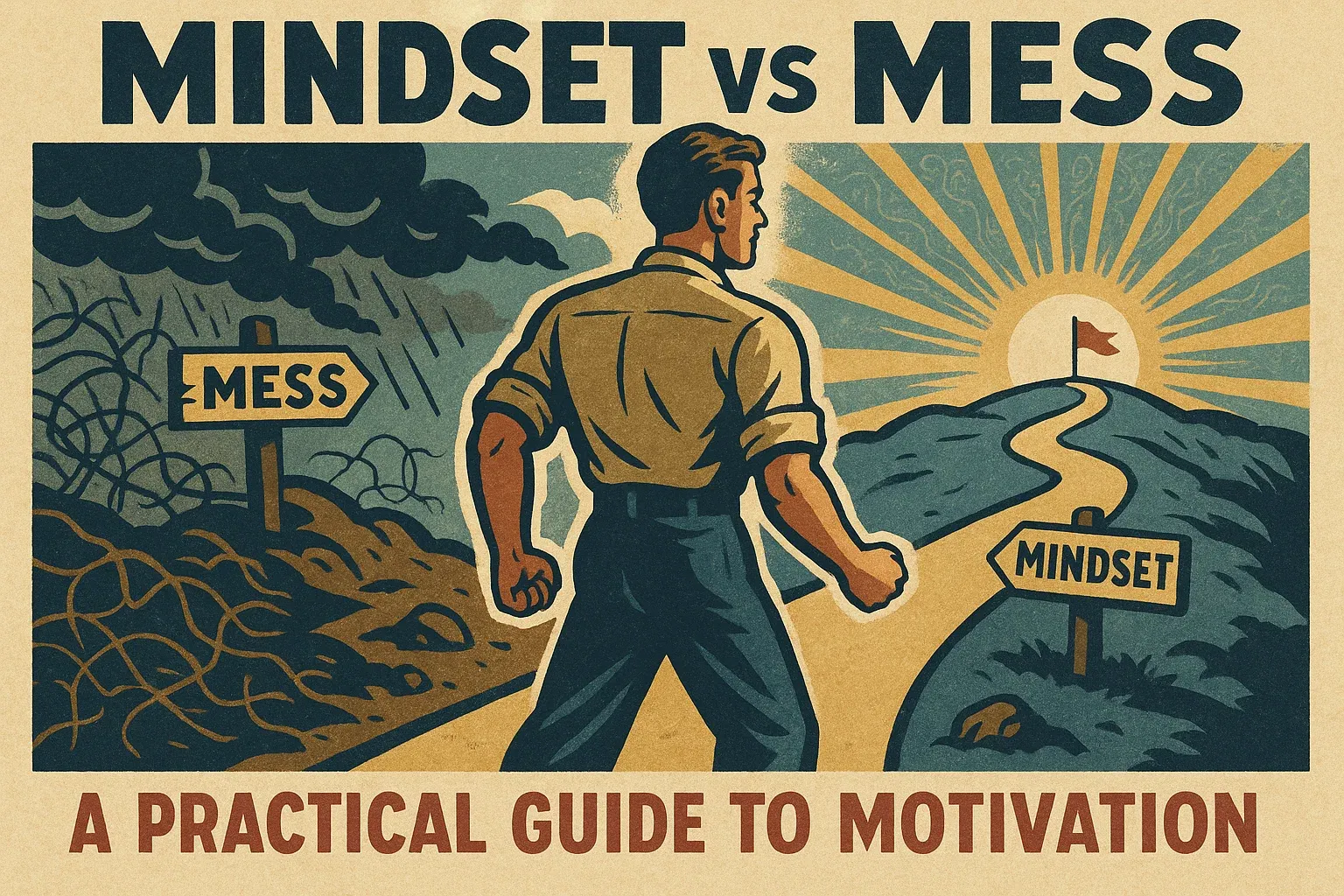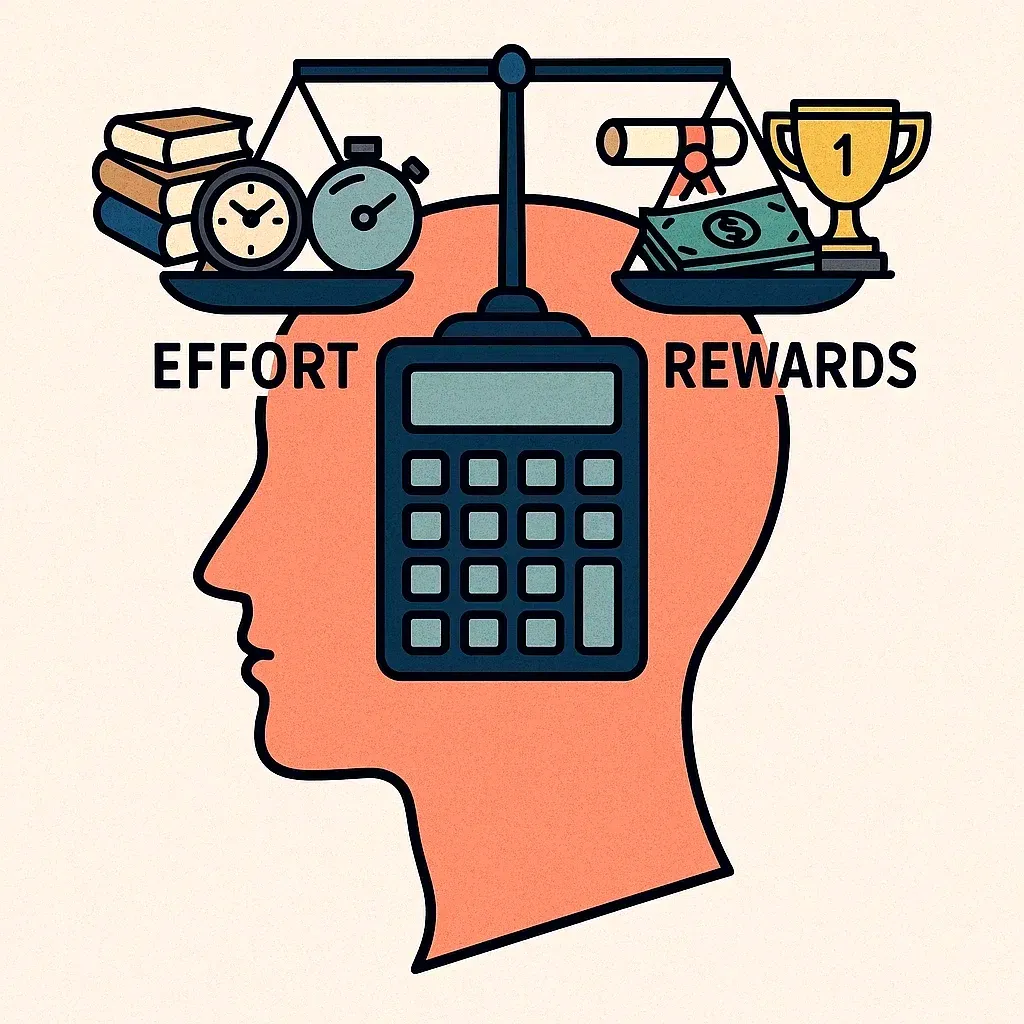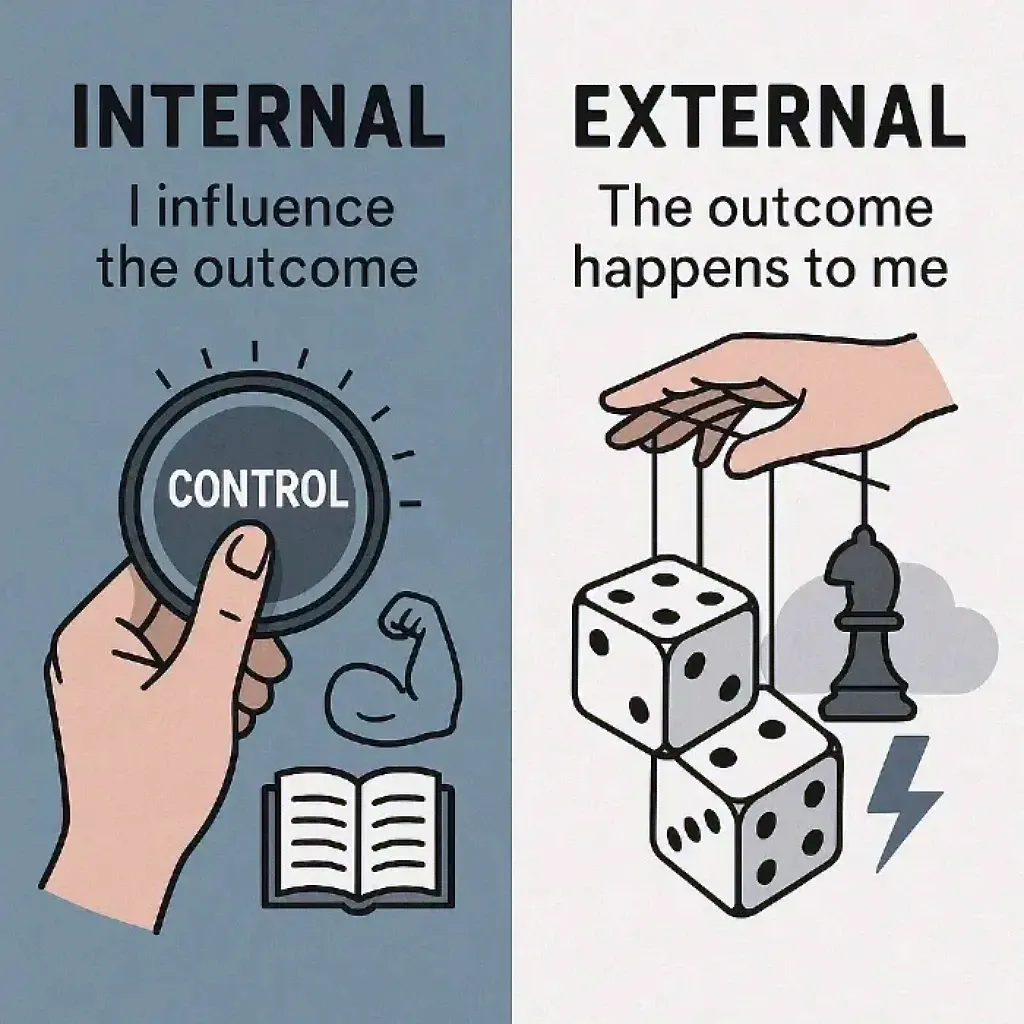Mindset vs. Mess: A Practical Guide to Motivation
Whether you’re trying to finally stick to a habit, tackle a huge goal, or just understand yourself a little better, these concepts might just change the way you look at your life — and yourself — forever. I know they've done that for me.

I often find myself wanting to get certain tasks done, or avoid certain habits (ahem, doomscrolling), only to find that the task gets pushed to tomorrow and I've fallen asleep two hours later than planned. Recently, though, I've made a huge effort to really pay attention to what it is that I do on a day-to-day basis. I guess I've just had enough, and in the process of really measuring what I'm doing each day, I recalled a few psychological principles that have really helped me understand myself and my motives.
In this post, I'd like to share three of those principles: Expectancy Theory, Locus of Control, and Self-Efficacy.
If those sound intimidating, don’t worry, I’ll break them down in a way that makes sense (and maybe even makes you laugh once or twice). Whether you’re trying to finally stick to a habit, tackle a huge goal, or just understand yourself a little better, these concepts might just change the way you look at your life — and yourself — forever. I know they've done that for me.
Let’s dive in.
What you expect is what you get.
The first concept comes from an American psychologist within the field of personality psychology known as Julian Rotter (1916 - 2014). The concept is known as Expectancy Theory, and although an entire book could be written on the idea, to put it briefly, it means that people act based on what they expect from the outcome. A business-savvy person might see it as your brain's “ROI Calculator”. It’s our way of saying, “Doing this is (or isn’t) worth it because I will (or won’t) get X.”
For instance, you will only finish reading this blog post (and hopefully you do) if you feel like the time and energy spent on it will end up with you having new, useful knowledge that can potentially change your life. Otherwise, you’ll stop reading right now. This is incredibly important because if you’re anything like me, you often go through your days doing things without actually thinking about why it is that we are doing them. According to expectancy theory, being aware of and intentional with your actions not only matters, but will have an impact on your life's trajectory.

Expectancy theory can be broken down into three core components:
- I believe I can do a task (or accomplish a goal).
- If I do accomplish this task, I will get a reward.
- The reward is worth getting.
These three components are known as Expectancy, Instrumentality, and Valence. It essentially means that we will only do something if A) we believe we are capable of doing it, B) that our effort will result in some reward, and C) that the reward is actually worth the effort - then the cycle continues. As a student for the past four years, this expectancy "cycle" within my life has looked something like:
- I believe I can earn a 3.8 GPA at the end of this semester. (or so I tell myself)
- If I get a 3.8 GPA, I'll have a better chance at getting into a good graduate school. (yay, more school)
- If I get into a good graduate school, I'll have better opportunities. (or so they say)
Understanding expectancy theory and the role it plays in your life is incredibly important, as these are the steps your brain takes before deciding to take action. And action = results. Fortunately, by asking ourselves questions and being introspective with regard to our actions (or lack thereof), we can begin to better understand this cycle within our lives.
Here are a few questions that I regularly ask myself to help apply this concept to my own life:
What makes me believe I can or can’t succeed at this?
Do I believe this task or habit will actually get me closer to my goal?
Why do I want this goal? Is it mine—or something I think I should want?
Unfortunately, I can't really help you answer the last two questions. However, there are two ideas that may help you understand the first one. Our Locus of Control (otherwise known as LoC) and Self-Efficacy.
"According to expectancy theory, being aware of and intentional with your actions not only matters, but will have an impact on your life's trajectory."
Believing is seeing (results)...
Have you ever noticed how some people seem to believe that life happens to them while other people seem to believe they can change anything about themselves or their lives?
Why is it that some people believe they can lose 100 pounds of bodyweight in the gym, while others feel like there's no point in trying?

All of us have certain things in our lives that we feel are under our control, even if it's as simple as choosing between single ply and double ply toilet paper (there's only one right choice there). If you took all of the things which you feel you are capable of controlling and put them into a bag, this bag would be considered your internal locus of control (LoC) - everything outside of that bag would be your external locus of control.
What's inside your bag (internal locus of control) is incredibly important for how you perceive the world and, consequently, how you choose to act. Whether or not something is in your internal locus of control impacts everything from how you set goals, how you receive feedback, the amount of effort you give (more on that in another blog), and how you handle failure. See the table below for examples.
| Context | Internal LoC | External LoC |
|---|---|---|
| Goal-setting | Sets challenging, self-determined goals | May wait for direction or avoid goals |
| Initiative | More proactive | More passive or reactive |
| Effort & persistence | Works harder through obstacles (believes effort matters) | Gives up more easily (believes effort is futile) |
| Feedback | Uses feedback constructively ("I can improve") | Takes it personally or blames others |
| Reaction to failure | "I need to improve my strategy" | "The system is rigged" or "bad luck again" |
It makes perfect sense when you think about it. No matter how hard you try, rolling a dice will always be outside of your control. Therefore, trying to get better at rolling dice would be as productive as a screen door on a submarine. You'd feel little to no motivation in doing such a thing.
But what happens when something isn't based on just chance? Unfortunately, most of us have areas within our lives that we feel we cannot change due to outside forces or unforeseen future circumstances, when that just isn't the case. By simply questioning our own beliefs, we can begin to expand our locus of control and experience real freedom (and build better submarines).
I've included a file with 18 questions (like the ones earlier) that you can ask yourself to see where your LoC lies in a Word document at the end of this blog. It also includes questions for the next concept: Self-Efficacy.
Subscribe to get full-access. It's FREE (really).
I think I can.. I think I can... I think I can!
If your locus of control is the map showing where you’re allowed to go, then self-efficacy is whether or not you believe you can actually make the journey.
You might know the destination is technically reachable (it's on your map), but self-efficacy decides if you think you can handle the road, the weather, the backseat driver, and the broken-down car along the way.
It's your opinion of your own competence. The term was initially coined by learning psychologist Robert Bandura, and since introducing it in 1977[1], there have been numerous studies on the topic.
The good news for me (and you), is that you can improve this view of yourself - and theres strong research to support it.

This improvement can be made using a strategy of four basic steps:
Small Wins: Set micro-goals and crush them[2]
It turns out that what you've accomplished in your past and how well (or poorly) you've succeeded before has a large role in how you rate your abilities going forward. Setting small, manageable goals and completing them literally rewires your brain - suddenly you are someone capable of completing goals. This is true even if those goals are as small as brushing your teeth in the morning or going for a daily walk. (Maybe making your bed is worth it after all!) Simply doing these tasks with intention and awareness will change your view of yourself. What's even better - these small accomplishments quickly add up to create momentum, allowing you to tackle larger and larger ones. An object in motion, keeps the doctor away! (I think that's how it goes)
Relatable Mentors: Find people who are where you want to be[3]
Realizing that others are experiencing the exact same struggles as you, and yet succeeded in a way you wish to succeed, can do wonders for your self-efficacy. It's completely normal to feel as though our situation is unique, and that those who are capable just have luck and fate by their side. While this may be true to some degree, a simple conversation with successful people will quickly make you realize how much you have in common - and you'll feel a little less alone as a result!
Positive Feedback: Find support/feedback from others[4]
Once you've found others who are similar to you or more successful (and have your best interest at heart), share your progress with them! Being told "you've got this" by someone you respect can boost your belief in your ability to succeed.
I remember a time when I had aspirations of going to medical school. The prospect of competing against so many other applicants who are super qualified seemed huge and overwhelming, and I began to doubt myself. I shared this with a mentor of mine who was a very well-respected, experienced doctor. He shared with me his own feelings of doubt in the past about himself, and reminded me of all the ways that I am capable. I never ended up pursuing medicine for other reasons, but his confidence in me killed that negative little troll in my head and made me feel unstoppable.
Regulate Emotions: Manage your anxiety, sleep, and mood[5]
None of the tips prior to this one will matter if your body is not in agreement with your mind. Each year, more and more research is released on the importance of sleep. (A recent study showed a 24% increase in heart attacks on the Monday after losing an hour of sleep due to Daylight Savings Time!)[6] Needless to say, your diet and sleep have a massive impact on how your mood, your abilities to focus, and overall energy levels. Ensuring that your physiology is under control is half (or more) of the entire battle. Less sleep leads to higher anxiety, and higher anxiety leads to lower ratings of self-efficacy!
"Low self-confidence, in turn, profoundly influences decision making and behavior. For example, anxious negotiators make low first offers, exit early, and earn less profit than neutral state negotiators. These effects are mediated by low negotiator self-efficacy. Similarly, anxious individuals seek out and rely more heavily on advice, even when the advice is obviously bad, because they do not feel confident in their own ability to make good judgments." Alison Brooks, Harvard Business School
In other words, within a business context, how you believe you will perform will actually affect your performance! If you're the voice in your head is causing doubts about your negotiation abilities, you are more likely to make less money in a deal, regardless of how capable you really are.
This applies outside of business as well. Take someone going on a first date for instance. If you believe you are unattractive and uninteresting, you'll come off as such. Confidence is key!
In Conclusion
These 3 basic concepts (Expectancy Theory, Locus of Control, Self Efficacy) are just the beggining in a journey of self-actualization. To understand ourselves, our capabilites, and the false limitations we place on ourselves can take a long time, but by reading this blog, you've started! Now you've got momentum!
Hopefully now you've got the map in your mind for how to navigate the goals in your life and the motivations behind them. Always analyze why it is that you are pursuing something, create an (internal and external) environment that improves your belief in yourself, and realize that you have more control over yourself and the things around you than you may think.
The ideas in this blog can be broken down into their own seperate posts - and I will likely do just that - but hopefully the quick introduction into each one will send you down this gratifying rabbit hole.
Also, much of this post has included the concept of goals in some way. Recenetly, I've been self-experimenting with my own goals, how I choose them, how (and if) I get them done, and whether I'm really as succesful as I'd like to be on a day to day basis. If you're interested, subscribe below and stay tuned! I'm really excited to share this fairly new process and I'll be providing some of the free tools I've used along the way.
Bandura A. (1977). Self-efficacy: toward a unifying theory of behavioral change. Psychol. Rev. 84, 191–215. 10.1037/0033-295X.84.2.191 LINK ↩︎
Pfitzner-Eden, F. (2016). Why Do I Feel More Confident? Bandura's Sources Predict Preservice Teachers' Latent Changes in Teacher Self-Efficacy. Frontiers in Psychology, 7, 1486. LINK ↩︎
Schunk, D. H. (1991). Self-efficacy and academic motivation. Educational Psychologist, 26, 207-231.LINK ↩︎
Lee, H. J., & Bong, M. (2023). Self-efficacy. International Encyclopedia of Education (Fourth Edition), 250-257.LINK ↩︎
Bandura, A. (1997). Self-efficacy: The exercise of control. W H Freeman/Times Books/ Henry Holt & Co. LINK ↩︎
Sandhu A, Seth M, Gurm HS. Daylight savings time and myocardial infarction. Open Heart. 2014 Mar 28;1(1):e000019. doi: 10.1136/openhrt-2013-000019. PMID: 25332784; PMCID: PMC4189320. LINK ↩︎
Subscribe for more content just like this.
Delivered to your inbox weekly.

